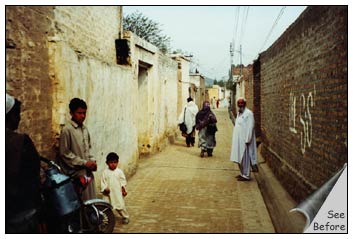 |
|||
|
|
|||
| Innovative sewerage in Orangi Project Karachi, Pakistan
A small amount of core external funding started the Orangi Pilot Project (OPP) in 1980. The purpose of the OPP was to promote community self-help and the provision of affordable sewerage systems in Karachi’s squatter settlements an to develop organizations that could provide and operate the systems. Coupled with an elimination of corruption and the provision of labor by community members, the costs (in-house sanitary latrine and house sewer on the plot, and underground sewers in the lanes and streets) are less than $70 a household (1992). The OPP staff has played a catalytic role by explaining the benefits of sanitation and the technical possibilities to residents and by conducting research and providing assistance. The OPP staff never handled the community’s money. The household’s responsibilities included financing their share of the costs, particularly in construction, and electing a “lane manager”, who typically represents about fifteen households. The land committees, in turn, elect members of neighborhood committees (typically around 600 houses) who manage the secondary sewers. Although the OPP concept includes municipal government subsidy and later cost recovery for sewer trunks and treatment plants, the state is financing these facilities without cost recovery. The OPP’s early success created a “snowball” effect, in part because of the increases in the value of property where lands (sic) had been installed. As the power of the OPP related organizations increased, they were able to bring pressure on the municipality to provide municipal funds for the construction of primary and secondary sewers. Sewerage has now been provided to more than 600,000 poor people in Karachi and several progressive municipal development authorities in Pakistan have attempted to follow the OPP method. The OPP approach of community involvement and responsibility has been adapted in Cairo, Egypt, where the Zabbaleen community, with support from the Ford Foundation and the World Bank, have developed a successful waste recycling enterprise that has spun off into several entrepreneurial efforts. The Opp has evolved into the OPP-Research and Training Institute and has developed model programs for low-cost housing, for basic health and family planning, for job- and entrepreneur-training for women, for supervised credit for microenterprises, and for upgrading privately-run schools.
|
|||
 “Many communities have followed the successful Orangi experience.” |
|||
|
|
|||
|
|||